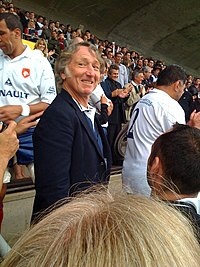JPR Williams

|
||
| Player information | ||
|---|---|---|
| Full name | John Peter Rhys Williams | |
| birthday | March 2, 1949 | |
| place of birth | Cardiff , Wales | |
| society | ||
| society | Career ended | |
| position | Goalkeeper , winger | |
| Clubs as active | ||
| Years | society | Games (points) |
| 1967-1968 | Bridgend | () |
| 1967-1968 | St. Mary's Hospital | (649) |
| 1968-1976 | London Welsh | 11 (50) |
| 1969-1977 | Barbarians | () |
| 1974 | natal | () |
| 1976-1990s | Bridgend | () |
| 1990s – 2003 | Tondu | () |
| National team | ||
| Years | National team | Games (points) |
| 1969-1981 | Wales | 55 (36) |
| 1971-1974 | British and Irish Lions | 8 (3) |
John Peter Rhys Williams (born March 2, 1949 in Cardiff ), commonly known as JPR Williams , is a former Welsh rugby union player and played for the Welsh national team between 1969 and 1981 . Many consider it one of the best fullbacks of all time.
His tough defense was particularly famous, but he was equally skilled, quick and agile in attack. Since he was also a good kicker, there was no "weak side" in his game. At a time when it was not considered appropriate in rugby union circles to say one liked rugby league , JPR Williams was one of the few who looked into the other code . He stated that his brief overkicks were based on rugby league technique.
Williams gave up tennis at his father's persuasion and played rugby, which was still an amateur sport at the time , in order to pursue a career in medicine . His obvious skills were quickly noticed and in 1969, at the age of 19, he made his international debut for Wales. In total, he was given this honor 55 times, plus he played eight times for the Lions . He played his club rugby for Bridgend and London Welsh .
There have been many highlights in his career: he was a key player in the Welsh national team that won the Grand Slam in 1971, 1976 and 1978 . He shone especially in the games against England: In ten games he scored five attempts and his team never lost. He also played an important role for the British Lions: in 1971, on the victorious tour to New Zealand, he scored a drop goal from a great distance. Three years later in South Africa he was part of the undefeated Lions team.
Many stories are told about its legendary hardness.
On the aforementioned Lions tour in South Africa, the team developed the infamous 99 call as a signal for the entire team to start a fight (see also British and Irish Lions ). When the call came in the game at the Boet Erasmus Stadium , JPR ran across half the pitch and knocked Johannes van Heerden, a much larger and heavier second-row striker, unconscious. He later said to Williams that this was the best punch he had ever received ( "the finest punch he had ever received" ).
Due to an injury crisis during the Welsh tour to Australia in 1978, he had to play in the last international game instead of the bottom position as a flanker. Although expected that he would not be able to cope with the tough physical demands of this position, he played impressively.
That same year, in a Bridgend game against the All Blacks , he was kicked at the bottom of an open scrum by opposing prop John Ashworth, which tore a hole in his cheek. Williams, a trained surgeon , left the field unimpressed , sewed up the wound himself and continued playing.
In 1981 he ended his national team career and continued to work as an orthopedic surgeon. In club rugby he was active as a player for many more years during the 1980s and 1990s.
Individual evidence
- ^ Rugby Dump: JPR Williams - face stamped
Web links
- David Walsh: 'England always asked us to go easy, not to beat them by too many points' , article and interview in The Times of March 13, 2005 (English)
- Tribute video
| personal data | |
|---|---|
| SURNAME | Williams, JPR |
| ALTERNATIVE NAMES | Williams, John Peter Rhys (full name); Williams, JPR |
| BRIEF DESCRIPTION | welsh rugby union player |
| DATE OF BIRTH | March 2, 1949 |
| PLACE OF BIRTH | Cardiff |